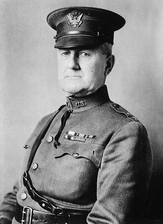
James Guthrie Harbord
(1866 – 1947)
Was a Lieutenant General in the United States Army and President and Chairman of the Board of RCA.
James Harbord was sent to the Caucasus to lead an American Military Mission to Armenia in order to provide detailed information about the country to the United States. Upon returning to the United States, Harbord wrote the Conditions in the Near East: Report of the American Military Mission to Armenia, which was a summary of the expedition that provided various details of the mission. The report includes maps, statistics, and a historical analyses of the country and its population. In addition to such details, Harbord collected evidence and information regarding the massacres of Armenians and was an eyewitness to them.
"The dead, from this wholesale attempt on the race, are variously estimated at from five hundred thousand to a million, the usual figure being about eight hundred thousand. Driven on foot under a hot sun, robbed of their clothing and such petty articles as they carried, prodded by bayonets if they lagged, starvation, typhus, and dysentery left thousands dead by the trail side."
(1866 – 1947)
Was a Lieutenant General in the United States Army and President and Chairman of the Board of RCA.
James Harbord was sent to the Caucasus to lead an American Military Mission to Armenia in order to provide detailed information about the country to the United States. Upon returning to the United States, Harbord wrote the Conditions in the Near East: Report of the American Military Mission to Armenia, which was a summary of the expedition that provided various details of the mission. The report includes maps, statistics, and a historical analyses of the country and its population. In addition to such details, Harbord collected evidence and information regarding the massacres of Armenians and was an eyewitness to them.
"The dead, from this wholesale attempt on the race, are variously estimated at from five hundred thousand to a million, the usual figure being about eight hundred thousand. Driven on foot under a hot sun, robbed of their clothing and such petty articles as they carried, prodded by bayonets if they lagged, starvation, typhus, and dysentery left thousands dead by the trail side."
